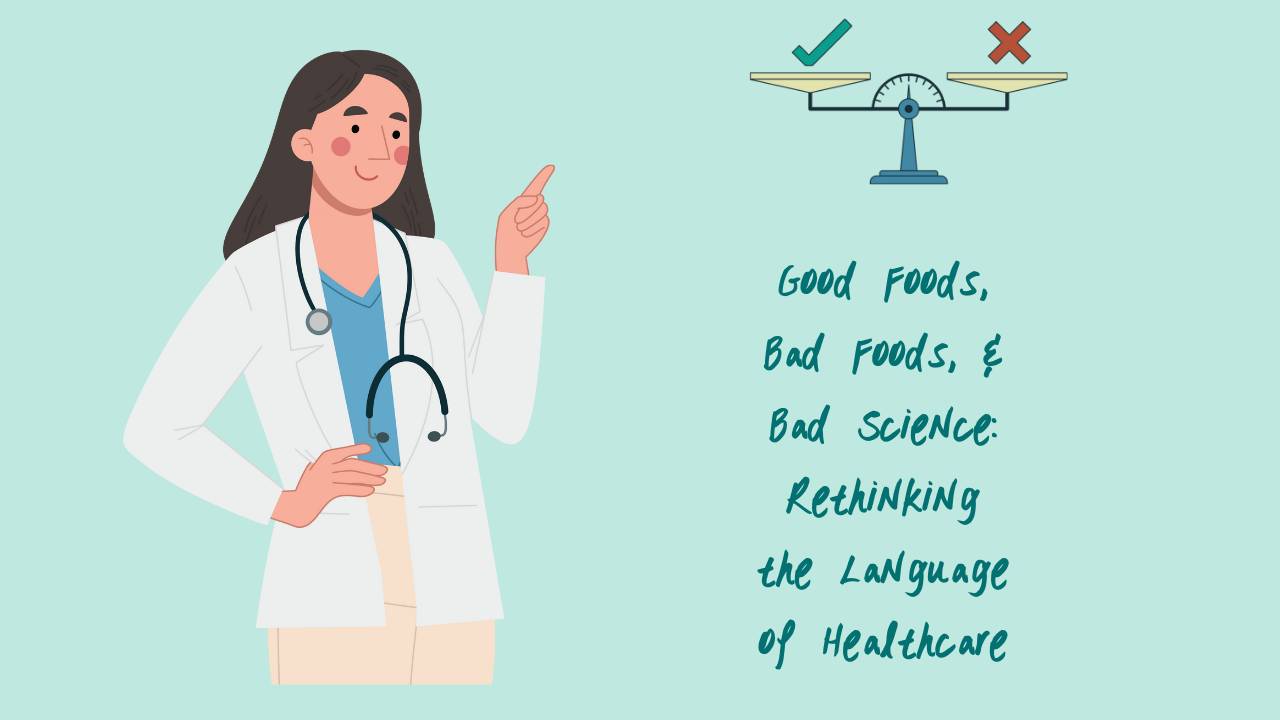The Impact of Biased Language in Healthcare
Mar 27, 2025
Healthcare’s Dirty Little Secret: Bias in Our Words
Imagine walking into a doctor’s office for a sore throat and walking out with a lecture about weight and “bad foods.” Sound familiar? For many people, especially those in larger bodies, this isn’t a one-time annoyance—it’s a recurring theme. Despite advances in science and our understanding of health, phrases like “good foods” and “bad foods” continue to pop up in medical offices (and everywhere else) as though they’re gospel truth.
It’s not just outdated—it’s harmful. Let’s dive into why these terms, along with others like obese and pre-diabetic, don’t just miss the mark; they actively hurt patients.
To be clear, I don’t think these doctors and other healthcare professionals intend harm – they are as human and prone to bias as everyone else. This article will focus on labels and language, but remember that there are a lot of dimensions to wellness and health – weight is not the best determinant of health.
The Problem with “Good” and “Bad” Foods
The idea of categorizing foods into “good” or “bad” oversimplifies a complex subject. Foods aren’t moral entities—they don’t earn halos or horns based on their nutritional profiles.
- Nutritional Nuance: A food’s value depends on context. A salad might be nutrient-dense, but if it’s the only thing you eat, you’ll lack essential nutrients like fats and carbs. Meanwhile, a chocolate bar might offer energy and joy.
- Shame on the Menu: Labeling foods as “bad” implies shame for eating them, which can drive disordered eating behaviors and increase stress—neither of which are good for health.
- Ignoring Access: Telling someone to “just eat better” without addressing barriers like cost, time, or availability is not only unhelpful; it’s dismissive and condescending. No one responds well to that – nor should they!
Doctors may have the best intentions, but by perpetuating these labels, they’re feeding into a diet culture that values aesthetics over health.
BMI: The Flawed Number That Won’t Die
Another staple of many healthcare visits is the Body Mass Index (BMI). What’s the harm in using BMI? Plenty.
- A Brief History of Bad Science: BMI was created in the 1800s by a Belgian mathematician, not a doctor, and was intended to study populations, not individuals. Despite this, it’s still treated like a definitive health marker.
- What It Misses: BMI doesn’t account for muscle mass, bone density, hydration, or fat distribution. Athletes and bodybuilders often “fail” the BMI test, and so do many perfectly healthy individuals.
- The Harm It Causes: Studies show BMI-based diagnoses can lead to weight bias in healthcare. Patients in larger bodies are often misdiagnosed or dismissed entirely, with providers attributing all health issues to weight rather than investigating further.
It’s time to toss BMI into the dustbin of outdated medical tools.
Obesity and Pre-Diabetes: When Labels Hurt
The words obese and pre-diabetic get thrown around casually in medical settings, often without consideration for their impact.
- Obesity: A Stigmatizing Label
The term obesity comes from a Latin word meaning “to overeat.” Its usage assumes that larger bodies are inherently diseased or caused by overeating, which is both simplistic and inaccurate. Not all larger bodies are unhealthy, and not all thin bodies are healthy.
Instead of treating “obesity” as a disease, healthcare providers should focus on behaviors and symptoms—like physical activity, mental health, and lab results—rather than size. - Pre-Diabetes: The Diagnosis That’s Not Really a Diagnosis
Pre-diabetes is often used as a wake-up call, but it’s a poorly defined condition that may not predict actual diabetes for many people. Worse, it can lead to unnecessary fear and overprescription of medications rather than focusing on manageable lifestyle adjustments.
The Real Cost of Weight Bias in Healthcare
These phrases and concepts aren’t just annoying—they have real-world consequences.
- Delayed Diagnoses: Patients in larger bodies report being dismissed or misdiagnosed. A person with a broken ankle might be told to “lose weight,” while their injury goes untreated.
- Healthcare Avoidance: Many who need care will avoid doctors because they feel shamed and judged – and we all know that doesn’t improve motivation to change or overall well-being.
- Mental Health Toll: Being repeatedly judged or shamed in healthcare settings increases stress and distrust in the medical system.
- Disordered Eating: For individuals with a history of eating disorders, hearing terms like “bad foods” or “obese” can trigger harmful behaviors.
Research supports these concerns. A 2018 study found that weight stigma in healthcare discourages people from seeking medical care, leading to worse health outcomes over time.
A Better Way Forward: Compassionate, Evidence-Based Care
Healthcare can do better. Here’s some of what needs to change:
- Ditch the Labels: Stop labeling foods and bodies with moralistic or binary terms. Instead of “good foods,” say “nutrient-dense” or “energy-providing.” Replace “obesity” with neutral, descriptive language like “higher weight.”
- Focus on Behaviors: Evidence shows behaviors like regular movement, stress management, and balanced eating improve health outcomes far more than weight loss alone.
- Ask, Don’t Assume: Instead of assuming someone’s health based on appearance, ask thoughtful questions:
- “How are you feeling overall?”
- “What do you feel supports your well-being?”
- “Are there any barriers to making changes you’d like to explore?”
- Recognize Systemic Factors: Healthcare must acknowledge how social determinants like poverty, food deserts, and racism affect health outcomes. Patients can’t control these factors, and “eat better” isn’t an answer to systemic problems.
Advocacy Starts with Awareness
Patients can play a role in challenging these norms, too. Here are some practical steps:
- Speak Up: If your provider uses stigmatizing language, let them know how it affects you. This might sound like, “I’d appreciate it if we could focus on behaviors rather than weight” or refusing to be weighed.
- Find Size-Inclusive Care: Look for providers who specialize in Health at Every Size (HAES) or weight-neutral approaches.
- Educate Yourself: Learn to recognize weight bias and arm yourself with evidence-based responses.
The Bottom Line
When doctors cling to outdated terms like “good foods” and “bad foods,” they perpetuate shame and misinformation. As patients, we deserve better. Healthcare providers have a responsibility to embrace compassionate, science-based approaches that focus on behaviors, not labels.
Shifting the narrative won’t happen overnight, but every conversation counts. Whether it’s challenging your doctor’s assumptions or advocating for better language, you can be part of the change. After all, health is about more than numbers or moral judgments—it’s about the whole person.
Let’s demand care that truly cares.
Resources & Links
- EDAW 2025
- Breaking Down Fatphobia & How to Do Better – January 2025
- So, How Do You Actually Decide What’s Reasonable for Yourself in a World Obsessed with Diets? – January 2025
- The Push/Pull of Therapy – Navigating the Gray Areas of Diet Culture & Change – December 2024
- National Eating Disorders Association (NEDA) Statistics: nationaleatingdisorders.org
- Article on Diet Culture’s Impact: Verywell Mind
- HAES Community Resources – Highlights weight-neutral health practices that align with the anti-diet messaging.
- Food Noise – September 2024
- ChatGPT’s Weight Stigma – September 2024
- Embracing Conversations on Weight Stigma – September 2024 WSAW
- Can Dieting Actually Lead to Long-Term Weight Loss? – NYT January 2024
- Problems with BMI – University of Rochester January 2024
- Eating Disorder Awareness Week 2023
- Why Size Doesn’t Matter, Part 2– February 2023
- Why Size Doesn’t Matter, Part 1- February 2023
- Creating an Anti-Diet Culture – June 2022
- Have Our Attempts to Curb Obesity Done More Harm Than Good?
- Association for Size Diversity and Health (ASDAH)
- Health at Every Size Research and Resources
- Self-Compassion Tools and Articles
- Weight Stigma (NEDA)
- Weight Stigma (Christy Harrison, MPH, RD, CDN)
- Weight Stigma Awareness
- Tips for Reducing Weight Bias in Students
- Weight Bias and Discrimination



